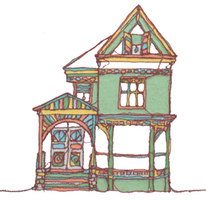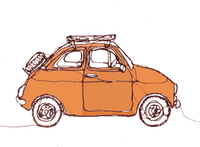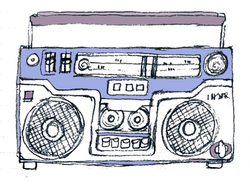We use cookies to provide the best site experience.
Ninfa Burnham

If you are interested in a personalised piece of art or have any other questions, please send me a message using this form...
The information you provide on this form will only be used to contact you in relation to your message unless you have also ticked the box to receive e-mail updates from me.
Join my mailing list for updates on new arrivals, inspirations and special offers
Soughdough Rules
Forn Sarret
Barcelona
Barcelona
I've arrived at the first stop in my Barcelona Faces Behind Facades quest.
The quest: Getting to know the people and stories that sit behind my
Barcelona Architectural Portraits collection.
Today I met with Marc Vidal, the owner of Forn Sarret, a traditional bakery perched on a corner
in the Eixample neighbourhood right next to the Girona metro station.
The quest: Getting to know the people and stories that sit behind my
Barcelona Architectural Portraits collection.
Today I met with Marc Vidal, the owner of Forn Sarret, a traditional bakery perched on a corner
in the Eixample neighbourhood right next to the Girona metro station.
The bakery started out life in 1898 with the Sarret family, and has not stopped making and selling bread since then. It passed through different owners until Marc's father, Joan Vidal, bought it in 1971. Marc and his wife have run the bakery for the last eight years and one thing is for sure - these two are passionate about their bread-making process, specifically the traditional soughdough or 'masa madre' as it is known in Catalan.

To get to the bakery, I took a walk from Passeig de Gracia. As I turned the corner into Calle Girona, there it was, a little piece of Modernista romance, with the whiplash curves of its dark wood facade wrapping themselves around the stained glass windows, doors, window display, shop sign, and the number 73. Although the facade could do with a little tender loving care, it has still retained its Art Nouveau elegance as it sits glamourously between two comparatively austere 20th century shops.


The Forn Sarret has not only managed to keep its original architectural features inside and out, but has also managed to keep its original commercial activity too - not an easy thing to do these days, with competition from large franchises. Marc believes that having had the continuity of the family business has helped, alongside a dedication that he and his wife bring to the bakery.
Speaking with him, his passion for bread is clear. All of the bread is made daily (well, nightly), and one by one. The doughs continue to be fermented in the traditional way - slowly, in the original wooden drawers using a natural process. Only masa madre (soughdough) is used for this.
He explained the art of cultivating the masa madre to me a little.
He explained the art of cultivating the masa madre to me a little.

Apparently, its all about time and environment, creating the right home for it to thrive. He described this care-taking a little like some would describe caring for a pet. Marc and his two bread-makers monitor the weather daily - they add the appropriate amount of yeast, depending on the temperature and humidity that day. In fact, its one of the reasons he doesn't tend to go away on holidays for long periods at a time - now that is what I would call dedication!
Now let´s talk about that oven…
Marc prides himself on their centenary oven. It sits tucked into a wall at the back of the shop, and behind a small heavy forged door. The dome-shaped oven is made entirely of stone and its floor revolves, so the breads cook very evenly. Originally fuelled by wood, it is now heated with gas and has an impressively large floor diameter of 4.5m. Marc told me that the characteristic flavours and aromas of breads baked using traditional methods in this 'forn de pedra' are recognised and loved by his regulars in the neighbourhood.
Marc prides himself on their centenary oven. It sits tucked into a wall at the back of the shop, and behind a small heavy forged door. The dome-shaped oven is made entirely of stone and its floor revolves, so the breads cook very evenly. Originally fuelled by wood, it is now heated with gas and has an impressively large floor diameter of 4.5m. Marc told me that the characteristic flavours and aromas of breads baked using traditional methods in this 'forn de pedra' are recognised and loved by his regulars in the neighbourhood.
The inside of the bakery still has its original wood panelling, including the (quite cute) gargoyle decorations that hold up the bread shelves (and that perhaps help to ward off unwanted spirits too!!). The door that leads to the oven area is glazed with some beautifully conserved engravings of butterflies, blades of wheat and poppies. In fact, I've noticed that poppies and wheat seem to be an ongoing theme in Modernista bakeries. It turns out that there is a good reason why they tend to appear as a double act - apparently, in the traditional farming of crop rotation, poppies would be planted in wheat fields in the Autumn to revitalise the soil for the next wheat growing season, boosting its nitrate levels and so making it more fertile. Apparently, this traditional (and environmentally sustainable) technique has been resurrected with some organic farmers today, which is encouraging to know.
These days, Forn Sarret offers us a rather large variety of freshly baked breads - over 40 in fact - they range from the traditional Payés loaf to the more contemporary onion bagel. For the sweet-toothed like me, there are over 50 varieties of cakes and pastries. I myself had my eye on one of the brazos de gitanos.
Forn Sarret is on Calle de Girona 73 in Barcelona
Visit the platform rutadelsemblematics.cat a project dedicated to preserving and promoting iconic establishments of Barcelona like this one
Visit the platform rutadelsemblematics.cat a project dedicated to preserving and promoting iconic establishments of Barcelona like this one
Stitched painting of Sarret Bakery
Marc and his wife
with one of their Payés breads
with one of their Payés breads
''This avocado green trimphone brings back strong memories of my teenage sister in the late 1970s - with
Farah Fawcett hair flicks, sprawled across our swirly patterned brown stairs chatting to her friends for a LONG time - and mum going crazy because of the spiral cable across the hall...
and the telephone bill.''
and the telephone bill.''
The Everyday...
We can discuss a personalised piece of art
Are you interested
in something specific?
in something specific?


Bookshelves are filled with all sorts of paraphernalia from our lives, including books of course! Have you grown to accept the steady migration of bits and pieces that come to populate the shelves? - memories from your travels, keepsakes nestled between a couple of 'volumes' and books half read then put down open for easy access later on. Bookshelves grow to reflect our lives.
Find out more about commissioning a personalised piece of art
You can also find me here...








